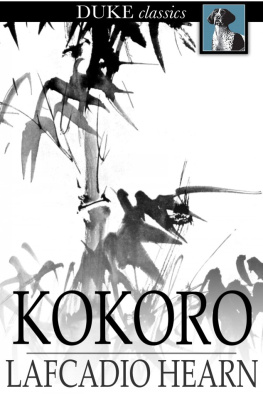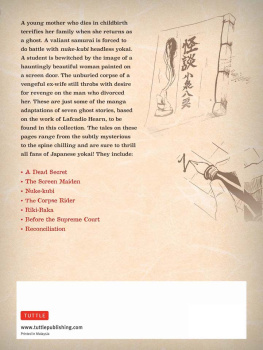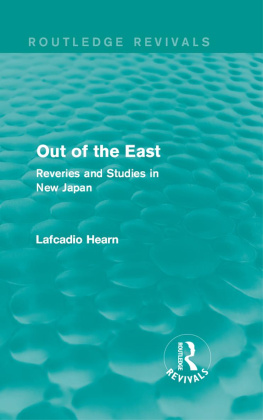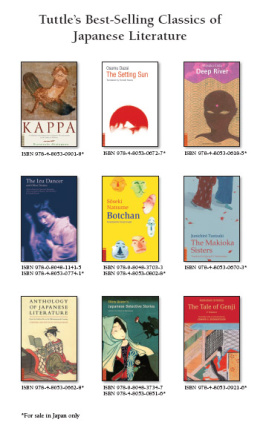LAFCADIO HEARN
LECTURER ON ENGLISH LITERATURE IN THE
IMPERIAL UNIVERSITY OF JAPAN
BOSTON AND NEW YORK
HOUGHTON MIFFLIN COMPANY
1897
CONTENTS
| A LIVING GOD |
| OUT OF THE STREET |
| NOTES OF A TRIP TO KYTO |
| DUST |
| ABOUT FACES EN JAPANESE ART |
| NINGY-NO-HAKA |
| IN SAKA |
| BUDDHIST ALLUSIONS IN JAPANESE FOLK-SONG |
| NIRVANA |
| THE REBIRTH OF KATSUGOR |
| WITHIN THE CIRCLE |
GLEANINGS IN BUDDHA-FIELDS
I
A LIVING GOD
I
Of whatever dimension, the temples or shrines of pure Shint are all built in the same archaic style. The typical shrine is a windowless oblong building of unpainted timber, with a very steep overhanging roof; the front is the gable end; and the upper part of the perpetually closed doors is wooden lattice-work,usually a grating of bars closely set and crossing each other at right angles. In most cases the structure is raised slightly above the ground on wooden pillars; and the queer peaked faade, with its visor-like apertures and the fantastic projections of beam-work above its gable-angle, might remind the European traveler of certain old Gothic forms of dormer. There is no artificial color. The plain wood soon turns, under the action of rain and sun, to a natural grey, varying according to surface exposure from the silvery tone of birch bark to the sombre grey of basalt. So shaped and so tinted, the isolated country yashiro may seem less like a work of joinery than a feature of the scenery,a rural form related to nature as closely as rocks and trees,a something that came into existence only as a manifestation of Ohotsuchi-no-Kami, the Earth-god, the primeval divinity of the land.
Why certain architectural forms produce in the beholder a feeling of weirdness is a question about which I should like to theorize some day: at present I shall venture only to say that Shinto shrines evoke such a feeling. It grows with familiarity instead of weakening; and a knowledge of popular beliefs is apt to intensify it. We have no English words by which these queer shapes can be sufficiently described,much less any language able to communicate the peculiar impression which they make. Those Shinto terms which we loosely render by the words "temple" and "shrine" are really untranslatable;I mean that the Japanese ideas attaching to them cannot be conveyed by translation. The so-called "august house" of the Kami is not so much a temple, in the classic meaning of the term, as it is a haunted room, a spirit-chamber, a ghost-house; many of the lesser divinities being veritably ghosts,ghosts of great warriors and heroes and rulers and teachers, who lived and loved and died hundreds or thousands of years ago. I fancy that to the Western mind the word "ghost-house" will convey, better than such terms as "shrine" and "temple," some vague notion of the strange character of the Shinto miya or yashiro,containing in its perpetual dusk nothing more substantial than symbols or tokens, the latter probably of paper. Now the emptiness behind the visored front is more suggestive than anything material could possibly be; and when you remember that millions of people during thousands of years have worshipped their great dead before such yashiro,that a whole race still believes those buildings tenanted by viewless conscious personalities,you are apt also to reflect how difficult it would be to prove the faith absurd. Nay! in spite of Occidental reluctances,in spite of whatever you may think it expedient to say or not to say at a later time about the experience,you may very likely find yourself for a moment forced into the attitude of respect toward possibilities. Mere cold reasoning will not help you far in the opposite direction. The evidence of the senses counts for little: you know there are ever so many realities which can neither be seen nor heard nor felt, but which exist as forces,tremendous forces. Then again you cannot mock the conviction of forty millions of people while that conviction thrills all about you like the air,while conscious that it is pressing upon your psychical being just as the atmosphere presses upon your physical being. As for myself, whenever I am alone in the presence of a Shinto shrine, I have the sensation of being haunted; and I cannot help thinking about the possible apperceptions of the haunter. And this tempts me to fancy how I should feel if I myself were a god,dwelling in some old Izumo shrine on the summit of a hill, guarded by stone lions and shadowed by a holy grove.
Elfishly small my habitation might be, but never too small, because I should have neither size nor form. I should be only a vibration,a motion invisible as of ether or of magnetism; though able sometimes to shape me a shadow-body, in the likeness of my former visible self, when I should wish to make apparition.
As air to the bird, as water to the fish, so would all substance be permeable to the essence of me. I should pass at will through the walls of my dwelling to swim in the long gold bath of a sunbeam, to thrill in the heart of a flower, to ride on the neck of a dragon-fly.
Power above life and power over death would be mine,and the power of self-extension, and the power of self-multiplication, and the power of being in all places at one and the same moment. Simultaneously in a hundred homes I should hear myself worshiped, I should inhale the vapor of a hundred offerings: each evening, from my place within a hundred household shrines, I should see the holy lights lighted for me in lamplets of red clay, in lamplets of brass,the lights of the Kami, kindled with purest fire and fed with purest oil.
But in my yashiro upon the hill I should have greatest honor: there betimes I should gather the multitude of my selves together; there should I unify my powers to answer supplication.
From the dusk of my ghost-house I should look for the coming of sandaled feet, and watch brown supple fingers weaving to my bars the knotted papers which are records of vows, and observe the motion of the lips of my worshipers making prayer:
"Harai-tamai kiyom-tama! ... We have beaten drums, we have lighted fires; yet the land thirsts and the rice fails. Deign out of thy divine pity to give us rain, O Daimyjin!"
"Harai-tamai kiyom-tama! ... I am dark, too dark, because I have toiled in the field, because the sun hath looked upon me. Deign thou augustly to make me white, very white,white like the women of the city, O Daimyjin!"
"Harai-tamai kiyom-tama!... For Tsukamoto Motokichi our son, a soldier of twenty-nine: that he may conquer and come back quickly to us,soon, very soon,we humbly supplicate, O Daimyjin!"
Sometimes a girl would whisper all her heart to me: "Maiden of eighteen years, I am loved by a youth of twenty. He is good; he is true; but poverty is with us, and the path of our love is dark. Aid us with thy great divine pity!help us that we may become united, O Daimyjin!" Then to the bars of my shrine she would hang a thick soft tress of hair,her own hair, glossy and black as the wing of the crow, and bound with a cord of mulberry-paper. And in the fragrance of that offering,the simple fragrance of her peasant youth,I, the ghost and god, should find again the feelings of the years when I was man and lover.










